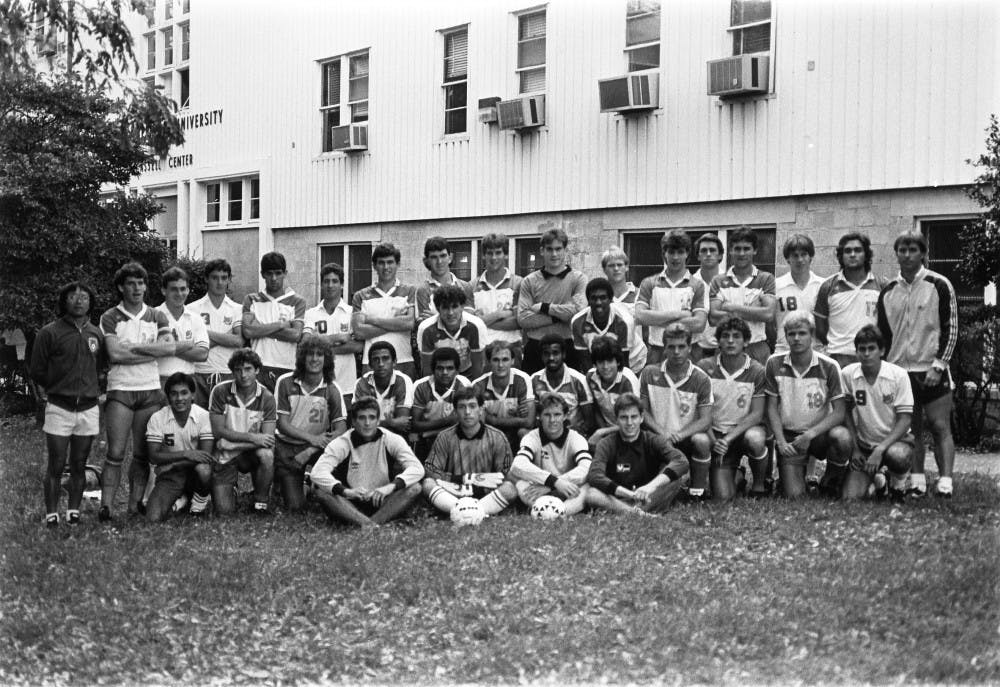In 1985, the AU men’s soccer team made history as the most successful soccer team to ever represent the school on the national stage. The Eagles battled through an eight-overtime thriller in the NCAA championships that year and eventually succumbed to the University of California at Los Angeles. However, they still hold an important place in the record books.
AU’s marathon match against UCLA prompted the NCAA to change overtime rules in college soccer and establish a penalty shootout for games that remain tied after two overtimes.
Peter Mehlert, AU’s head coach in 1985, built the culture of his team from scratch and feels honored to have coached the world-class athletes who took the field in that year, he said. Michael Brady, a forward, scored 24 goals and won National Player of the Year honors in ’85. David Nakhid, father of current AU midfielder Panos Nakhid, was a key cog in the midfield and later went on to captain Trinidad and Tobago at the World Cup.
“I was so lucky to recruit these players to campus,” Mehlert said. “I can tell you, and any coach will tell you, that success and winning depends on the players.”
Members of the 1985 team returned to Reeves Field on Oct. 3, Alumni Day, to celebrate their accomplishment and watch the current varsity team take on the Boston University Terriers.
For a majority of the players on the 1985 team, the game marked their first time on campus since they had graduated, but as they walked around, they reconnected instantly. The old teammates laughed and joked all the way to the field, where they were celebrated at halftime for their remarkable run to the National Championship.
The Eagles success on the field in 1985 brought a flood of school spirit to campus, and the team hosted the semifinal match on Reeves Field in December of that year.
“We would put posters in every single dorm floor, every classroom on campus,” Mehlert said. “The players were ambassadors for soccer. WE would usually have great attendance at games.”
Mehlert said the game brought over 6,000 fans to the field, and the game turned into a spectacle. AU brought out extra bleachers to accommodate the spectators, and students poured out of the seats into the space behind each goal. Some fans even climbed the surrounding trees to get a view.
“The game was spectacular,” former defender Greg McConnell said. “Seeing the whole field full of spectators it was just great.”
The Eagles won the semifinal in dramatic fashion, beating Hartwick College 1-0 on a header from midfielder Fernando Iturbe.
“Scoring the goal was one of my highlights in all of my time in D.C.,” Iturbe said. “It was really amazing.”
The scene remains immortalized in a photo on the second floor of Bender Arena.
Iturbe’s heroic header helped the Eagles earn their chance to play for the national championship at the Kingdome in Seattle, Wash. against UCLA.
UCLA, a large state school known for its strong soccer tradition, boasted a roster full future national team stars such as Paul Krumpe, Eric Biefield and Paul Caligiuri. The Eagles, on the other hand, played in the Colonial Athletic Association, a less competitive conference with smaller schools and smaller teams.
At the end of regulation, the game remained locked at 0-0. Eight overtime periods later, UCLA put the ball in the back of the net, ending the longest game in the history of men’s college soccer. By the time UCLA scored the winner, the Eagles were down to 9 men, after losing star forward Brady to injury and another player to a red card.
“We just couldn’t finish,” Mehlert said. “The second half was more even, but we dominated the first half. We outshot them 10-1.”
David Nakhid also remembers the game as a proud moment in Eagle history and said the team proved itself superior to the Bruins at times during the match.
“Coming from a small school like AU with little or no tradition of sports excellence, playing against UCLA and being better than them on the day, is a good piece of nostalgia,” Nakhid said.
Playing eight overtimes took a toll on the Eagles, Brady said, and the fatigue caught up with the team.
“We were maybe a better soccer-playing team, but they had an extra guy and were more athletic which allowed them to keep coming at us,” Brady said. “But no excuses. We had our chances to win in regular time. We didn’t. It is what it is.”
This year’s Alumni Day ended in regulation, as the Eagles fell to Boston 1-0 when the Terriers notched a goal in the first three minutes. However, instead of focusing on the game, the ’85 players cherished their historic season, a season that will remain etched in AU history forever.





